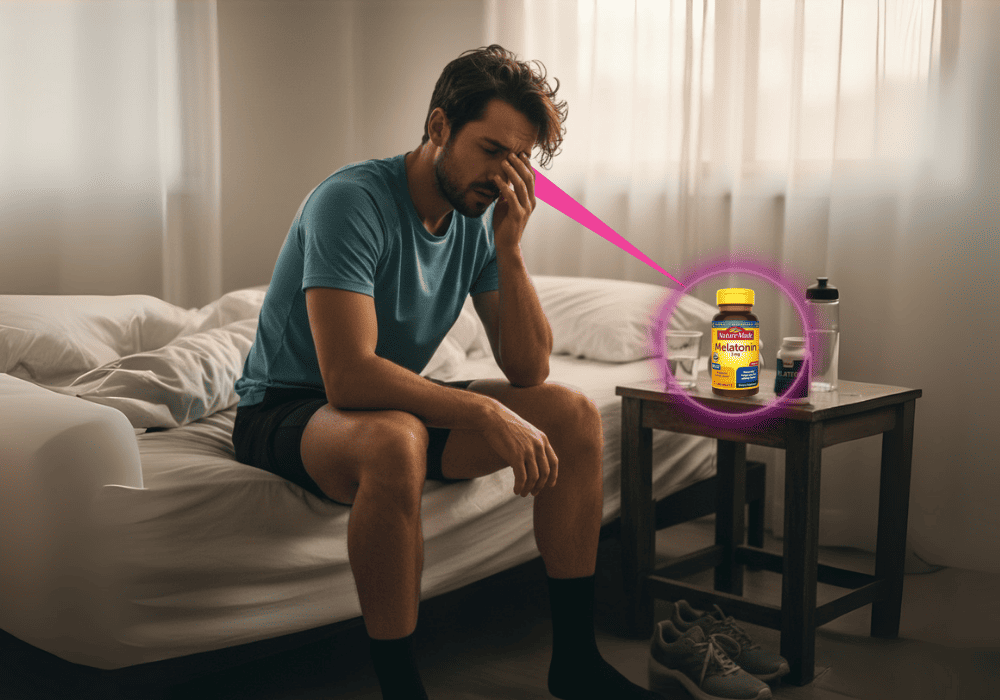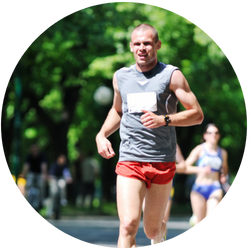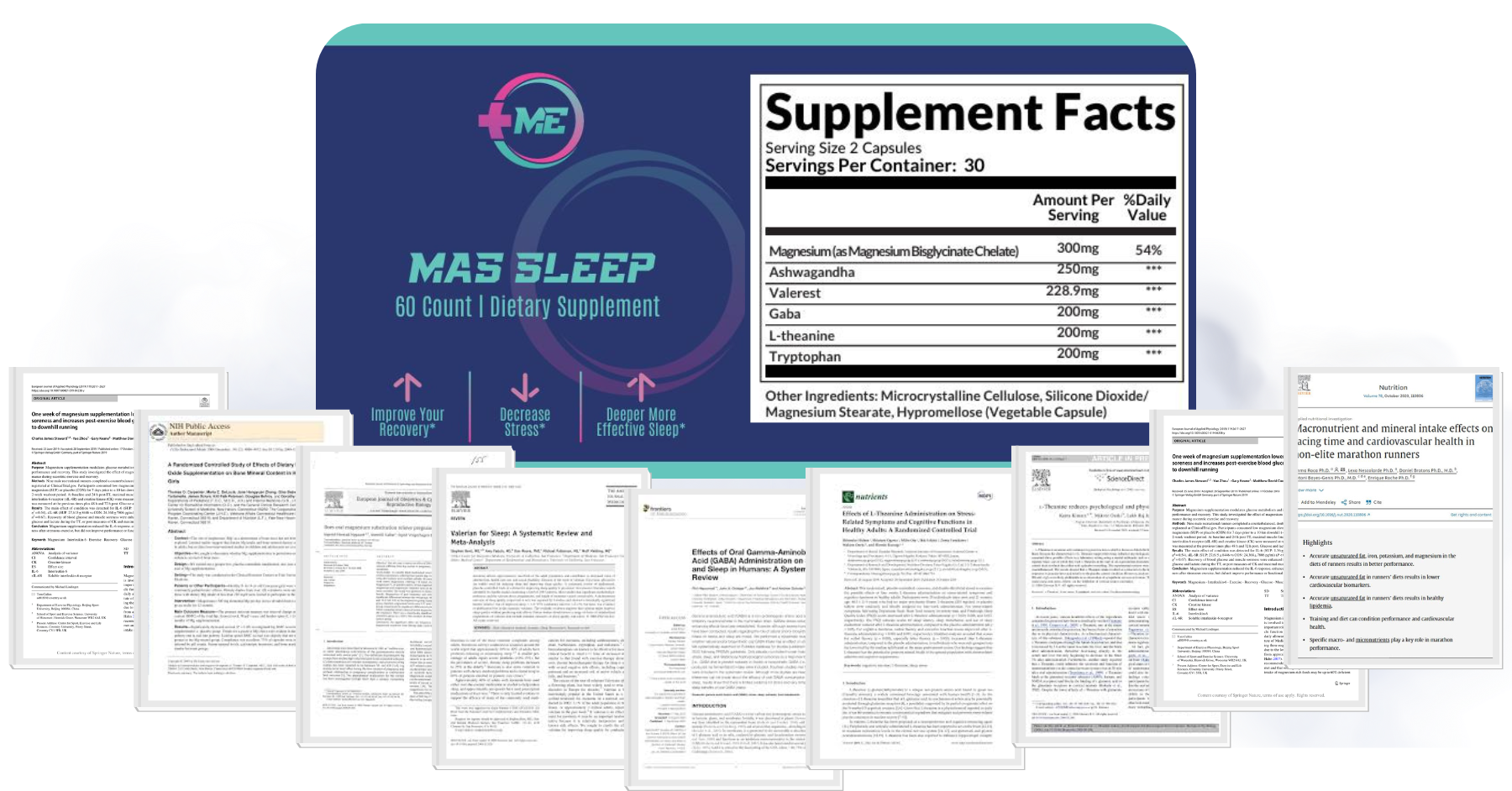If you’re like most athletes I coach, you’ve probably turned to melatonin as your go-to sleep aid, especially if you train in the evenings or generally have trouble getting enough sleep.
For years, melatonin was heralded as the natural solution to help you get to sleep faster.
Unfortunately, as new research emerges, what once seemed liked a harmless, natural solution might actually be working against your athletic goals in ways you never expected.
So, in this article we’re going to breakdown the research on how melatonin actually works. You’ll learn…
- The hidden performance problems – How melatonin disrupts the specific recovery processes that make you faster and stronger
- The dependency trap – Why your natural sleep systems get worse the longer you use supplements
- Evidence-based alternatives – Four proven strategies that optimize your body’s own sleep mechanisms (you can implement these tonight)
By the end, you’ll have a complete roadmap for achieving deeper, more restorative sleep without the negative impacts on your training adaptations and hormone production.
The Hidden Problems with Melatonin
Despite it being a natural solution, regular melatonin use can actually impair the very physiological processes that make you faster and stronger.
The main issue is that when you take melatonin regularly, your body begins to downregulate its natural melatonin production, creating a dependency cycle that leaves you worse off than when you started.
Research shows that exogenous (external) melatonin supplementation can suppress endogenous (natural) melatonin production by up to 50% within just two weeks of regular use [1].
Basically, what happens is like training your body to forget how to produce its own sleep hormone.
The more you rely on external melatonin, the less capable your pineal gland becomes at manufacturing the precise amount and timing your body needs for optimal recovery.
But the dependency issue is only part of the problem.
Studies have shown that melatonin supplementation can significantly alter your natural cortisol rhythm, which is crucial for athletic adaptation and recovery [2].
When your cortisol patterns become disrupted, your body’s ability to respond to training stress and build fitness becomes compromised.
How Melatonin Disrupts Recovery
So now that we understand why using melatonin can be a difficult habit to break that only intensifies the more you use it, let’s look at why needing increasing amounts of melatonin may be interfering with your training
Reduces growth hormone production
The first evidence-based concern for athletes is how external melatonin supplementation interferes with growth hormone production.
Growth hormone is released in powerful pulses during deep sleep stages, and it’s absolutely critical for muscle repair, tissue regeneration, and athletic adaptation.
Unfortunately, research demonstrates that exogenous melatonin can disrupt the natural timing and amplitude of growth hormone release [3].
This happens because melatonin affects the intricate dance between your circadian rhythms and the hormonal cascades that drive recovery.
When you artificially manipulate melatonin levels, you’re essentially throwing off the entire orchestration of recovery hormones.
Disrupted temperature regulation
Studies show that melatonin significantly affects your body’s core temperature regulation, which can interfere with both sleep quality and athletic performance [4].
Melatonin causes a rapid drop in core body temperature, which sounds good for sleep initiation.
However, this artificial temperature manipulation can disrupt your body’s natural thermoregulatory processes that are essential for temperature control during exercise.
For athletes, this creates a particularly problematic scenario.
Your body needs to maintain precise temperature control during training and competition, but regular melatonin use can impair these natural mechanisms.
Research indicates that athletes using melatonin supplements show altered heat dissipation responses during exercise [5].
The practical takeaway is clear…
Instead of relying on direct melatonin supplements that disrupt your natural temperature regulation, focus on creating optimal sleep temperature conditions naturally through your environment and pre-sleep routine.
Evidence-Based Alternatives That Actually Work
Okay, we now know that consistent melatonin use isn’t the best way to help us improve our sleep quality.
But, with sleep being so critical, how do we actually fall asleep faster and improve our sleep quality?
Increase morning light exposure
The first evidence-based strategy is optimizing your natural melatonin production through light exposure management.
This sounds “sciencey” but it really just means getting more sunlight in the mornings and evenings.
Research shows that consistent morning light exposure increases natural melatonin production by up to 30% in the evening [6].
Moreover, early morning sun increases early-day cortisol release (the ideal time for elevated cortisol) and prepares the body for sleep later that night.
A morning spike in cortisol will also positively influence your immune system, metabolism and ability to focus during the day.
Later in the day, try to get outside in the afternoon.
The particular wavelengths of the sun when it is low in the sky (yellows and oranges, in contrast with blue) come through even if it’s overcast.
Sunlight viewed in the late afternoon/evening communicates to the brain’s circadian clock that it is evening and time to begin the process of transitioning to sleep that night.
Also, on the occasional day you miss getting outside early in the morning, the afternoon sunlight serves as a second “anchor point” for your brain and body to know the time/season, in order to maintain the consistency of your circadian clock.
Here’s what you need to do
Get 10-15 minutes of direct sunlight within the first hour of waking, preferably before 9 AM.
Then try to do the same in the afternoon, around sunset.
This simple practice helps reset your circadian clock and ensures robust natural melatonin production when you actually need it—at bedtime.
Eliminate Blue Light
The second critical element involves eliminating blue light exposure 2-3 hours before bed.
You’ve likely heard this advice before, but how often do you consciously put it into practice?
This is one of those “easy and cheap” things you can do to dramatically improve sleep quality if you put your mind to it.
Studies demonstrate that even small amounts of blue light can suppress melatonin production by up to 85% [7].
This means your phone, TV, and computer screens are literally preventing your body from producing the sleep hormone it needs.
Moreover, blue light has been shown to trick our brain into thinking it is still daytime, disrupting circadian rhythms and leaving us feeling alert instead of tired.
Here’s what you need to do
Be conscious for a few days or a week or two of how much time you spend in front of your devices before bed and track how much your sleep improves.
I am willing to bet you’ll see a huge improvement in sleep markers with just this change.
Keep Your Bedroom Cold
Your body’s ability to regulate your body temperature plays a critical role during sleep.
This is because your sympathetic nervous system is less excited and calmer in cooler conditions, especially during sleep.
Creating a cool sleep environment (65-68°F) also enhances natural melatonin production and improves sleep onset time by an average of 13 minutes [8].
Moreover, body temperature increases are one of the main reasons you may wake up at night.
Increase Melatonin Naturally
While we’ve seen the hidden drawbacks of supplementing directly with melatonin, there are supplements we can use that help our bodies produce more natural melatonin.
Magnesium
Magnesium helps convert serotonin (a neurotransmitter in the brain) into melatonin.
It acts as a cofactor for enzymes in this conversion process, particularly helping activate the enzyme that facilitates this transformation in your pineal gland.
Magnesium also helps regulate your body’s internal clock by influencing the part of your brain that controls circadian rhythms. This helps ensure melatonin is released at the right times.
L-theanine
L-theanine is an amino acid found primarily in tea leaves that promotes relaxation by increasing levels of calming neurotransmitters like GABA, serotonin, and dopamine in the brain.
This creates a relaxed but alert state, reducing stress and anxiety without causing drowsiness.
While L-theanine doesn’t trigger melatonin production itself, it may support your natural melatonin rhythm by:
- Reducing stress and anxiety – High stress and cortisol can suppress melatonin production. By promoting relaxation, L-theanine may help remove barriers to normal melatonin release
- Improving sleep quality – L-theanine can help you fall asleep more easily and achieve deeper, more restorative sleep, which supports healthy circadian rhythms
- Calming racing thoughts – By quieting mental chatter before bed, it may help you wind down naturally when melatonin levels should be rising
Ashwaganda
Like L-theanine ashwagandha supports better sleep by regulating the balance between the stress hormone cortisol and melatonin.
Cortisol is a stress hormone that works in direct opposition to melatonin.
The more cortisol you produce, from stressors like work, family and even the training you do, the more alert and awake you’ll feel at night.
By lowering cortisol levels, ashwagandha helps create a more favorable environment for melatonin to be produced naturally in the evening.
That's Why We Created MAS Sleep
MAS Sleep was created by athletes for athletes.
Unlike traditional sleep supplements that “knock you out” with melatonin and other habit-forming ingredients, we’re focused on improving your recovery through sleep.
We took all the most highly researched sleep ingredients and put them all in one formula.
That means…
- MAS sleep is a one-stop shop to improve your sleep quality from night 1.
- Ingredients that promote recovery while you sleep
- Athlete-proven dosages that help you achieve 90%+ sleep scores
- All natural, with no melatonin
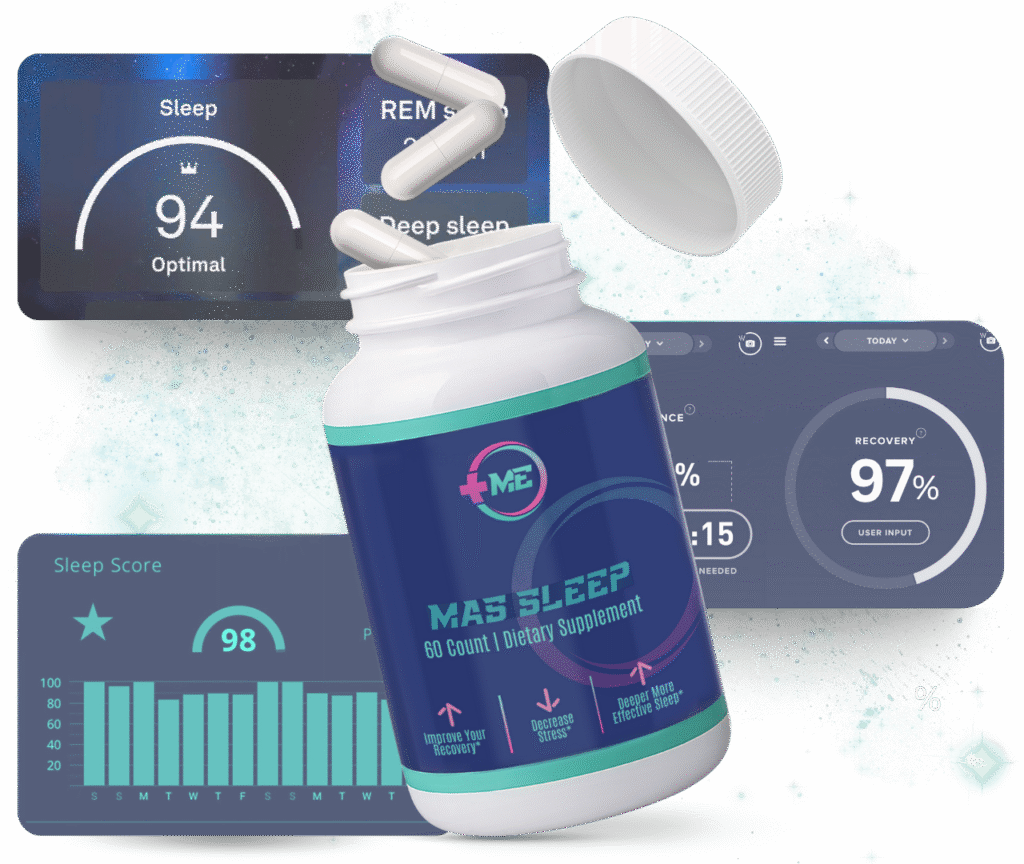
What Makes MAS Sleep Different?
Unlike traditional sleep supplements that “knock you out” with melatonin and other habit-forming ingredients, we’re focused on improving your recovery through sleep.
That means clinically researched, natural ingredients you can safely take everyday to improve your sleep quality.
Increase Deep, R.E.M Sleep
Clinically data and our customer feedback show significant increases to their sleep scores with most averaging 90% + per night.
Boost Recovery
Research on our ingredients has shown deeper sleep leads to faster and more efficient recovery so you can absorb all of your hard training.
Wake Up Rested
No melatonin means you wake up refreshed and without the typical grogginess you get with other sleep supplements.
Helps Calm & Relax
MAS Sleep helps calm the body and central nervous system, especially after hard training days, so your mind can naturally unwind after a long, busy day.
Stay Asleep Longer
Interrupted or fragmented sleep is a major reason we feel tired even after "7+ hours" of sleep. MAS Sleep allows you to get and stay in deep sleep longer.
Fall Asleep Faster
At the core of modern sleep problems is stress: neural circuits that just won't turn off. MAS Sleep is like naturally turning the lights off before you go to bed.
INGREDIENTS CLINICALLY SHOWN IN OVER 21 STUDIES TO help you get the best sleep of your life
Formulated by in-house researchers to contain clinically effective doses of only the most research-backed sleep ingredients. No bullsh** patented formulas or harsh sedatives. 35+ clinicians and health professionals confidently recommend MAS Sleep.
- Magnesium (300mg)
- Ashwagandha (250mg)
- Valerest (228.9mg)
- Gaba (200mg)
- L-theanine (200mg)
- Tryptophan (200mg)
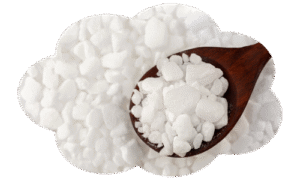
Magnesium (as Magnesium Bisglycinate Chelate)
Magnesium is the single best “sleep supplement” you can use. It’s supported by countless research studies and impacts sleep, performance, and recovery on multiple levels.
Moreover, studies suggest that 75% of endurance athletes are deficient in magnesium, so it is likely a mineral you need to supplement with regardless if you need to improve your sleep or not.
- Improve recovery between workouts by reducing the stress intense running causes [1]
- Help you enter a state of “deep sleep” longer to recover better since it lowers cortisol levels [4]
- Increase testosterone levels [5]
- Directly improves endurance performance by reducing heart rate, ventilation, oxygen uptake, and oxygen consumption [6,7,8.9]
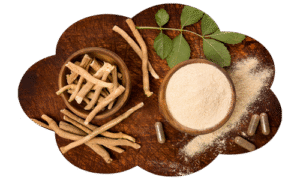
Ashwagandha
Ashwagandha is known for its stress-reducing properties, and stress and anxiety are common culprits behind sleep disturbances. By calming the nervous system, ashwagandha may indirectly promote better sleep.
Some studies suggest that ashwagandha can lead to improvements in sleep parameters like sleep onset latency (the time it takes to fall asleep), total sleep time, and sleep efficiency (the ratio of time spent sleeping to time spent in bed).
Research indicates that ashwagandha may help reduce the number of times people wake up during the night.

Valerest
Valerest is a proprietary blend of natural ingredients, including valerian root, designed to promote sleep and relaxation.
Results from multiple studies indicate that valerian — a tall, flowering grassland plant — may reduce the amount of time it takes to fall asleep and help you sleep better.
Specifically, a systematic review of 16 randomized controlled trials found that valerian improved sleep quality in 80% of trials [1]
In a meta-analysis of 18 studies valerian showed a statistically significant benefit compared to placebo [2] and in a study of 128 patients, 44% reported perfect sleep and 89% reported improved sleep after valerian [3]
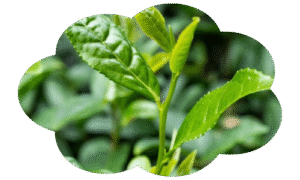
Gaba
Gamma aminobutyric acid (GABA) is a neurotransmitter that binds to receptors between neurons and reduces their tendency to “fire” and transmit nerve impulses.
This, in turn, can reduce stress and excitement and promote calm and restfulness, which is why research shows that supplementation with GABA . . .
May reduce the time it takes to fall asleep [1,2,3]
Improves the perceived quality of sleep [4,5]
Increases sleep efficiency [6]
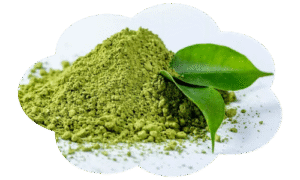
L-theanine
L-theanine is an amino acid found primarily in tea that helps balance the levels of two chemicals in the brain known as glutamate and GABA, which transmit nerve impulses.
This, in turn, can reduce anxiety and promote relaxation without causing drowsiness, which is why research shows that supplementation with L-theanine . . .
- Reduces the time it takes to fall asleep [1]
- Improves restfulness after sleep [2]
- Supports relaxation [3]
- Reduces the effects of mental stress [4]
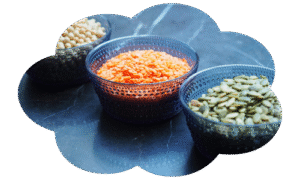
Tryptophan
Tryptophan is an essential amino acid and a precursor to serotonin and melatonin, both of which are crucial in sleep regulation. But, unlike melatonin, tryptophan does not impair REM sleep or cause dependency.
- Low-dose tryptophan (200 mg) has been shown to increase subjective sleepiness and decrease wakefulness before sleep onset.
- Polysomnographic studies show tryptophan increases Stage 3 (deep) sleep and reduces nighttime awakenings.
- Magnesium
- Ashwagandha
- Valerest
- Gaba
- L-theanine
- Tryptophan

Magnesium (as Magnesium Bisglycinate Chelate)
Magnesium is the single best “sleep supplement” you can use. It’s supported by countless research studies and impacts sleep, performance, and recovery on multiple levels.
Moreover, studies suggest that 75% of endurance athletes are deficient in magnesium, so it is likely a mineral you need to supplement with regardless if you need to improve your sleep or not.
- Improve recovery between workouts by reducing the stress intense running causes [1]
- Help you enter a state of “deep sleep” longer to recover better since it lowers cortisol levels [4]
- Increase testosterone levels [5]
- Directly improves endurance performance by reducing heart rate, ventilation, oxygen uptake, and oxygen consumption [6,7,8.9]

Ashwagandha
Ashwagandha is known for its stress-reducing properties, and stress and anxiety are common culprits behind sleep disturbances. By calming the nervous system, ashwagandha may indirectly promote better sleep.
Some studies suggest that ashwagandha can lead to improvements in sleep parameters like sleep onset latency (the time it takes to fall asleep), total sleep time, and sleep efficiency (the ratio of time spent sleeping to time spent in bed).
Research indicates that ashwagandha may help reduce the number of times people wake up during the night.

Valerest
Valerest is a proprietary blend of natural ingredients, including valerian root, designed to promote sleep and relaxation.
Results from multiple studies indicate that valerian — a tall, flowering grassland plant — may reduce the amount of time it takes to fall asleep and help you sleep better.
Specifically, a systematic review of 16 randomized controlled trials found that valerian improved sleep quality in 80% of trials [1]
In a meta-analysis of 18 studies valerian showed a statistically significant benefit compared to placebo [2] and in a study of 128 patients, 44% reported perfect sleep and 89% reported improved sleep after valerian [3]

Gaba
Gamma aminobutyric acid (GABA) is a neurotransmitter that binds to receptors between neurons and reduces their tendency to “fire” and transmit nerve impulses.
This, in turn, can reduce stress and excitement and promote calm and restfulness, which is why research shows that supplementation with GABA . . .
-
May reduce the time it takes to fall asleep [1,2,3]
-
Improves the perceived quality of sleep [4,5]
-
Increases sleep efficiency [6]

L-theanine
L-theanine is an amino acid found primarily in tea that helps balance the levels of two chemicals in the brain known as glutamate and GABA, which transmit nerve impulses.
This, in turn, can reduce anxiety and promote relaxation without causing drowsiness, which is why research shows that supplementation with L-theanine . . .
- Reduces the time it takes to fall asleep [1]
- Improves restfulness after sleep [2]
- Supports relaxation [3]
- Reduces the effects of mental stress [4]

Tryptophan
Tryptophan is an essential amino acid and a precursor to serotonin and melatonin, both of which are crucial in sleep regulation. But, unlike melatonin, tryptophan does not impair REM sleep or cause dependency.
- Low-dose tryptophan (200 mg) has been shown to increase subjective sleepiness and decrease wakefulness before sleep onset.
- Polysomnographic studies show tryptophan increases Stage 3 (deep) sleep and reduces nighttime awakenings.
Human Clinical Studies
100% All Natural
Third Party Tested
Vegan & GMO Free
Made in USA
115 sleep trackers report MAS Sleep significantly improved sleep quality within the first 4 days
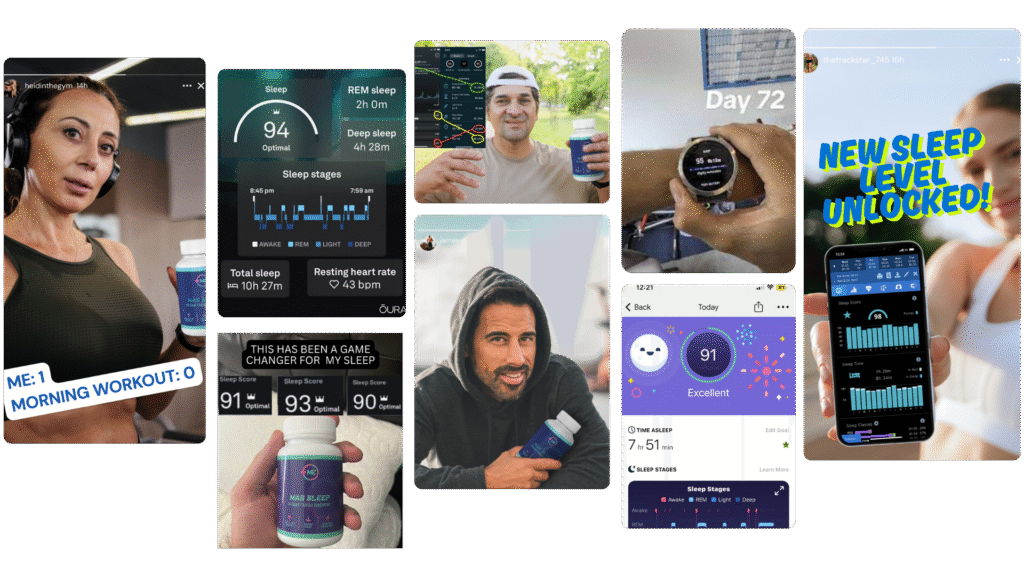





The Bottom Line
With the right evidence-based approach, you can achieve better sleep quality than melatonin supplementation without the negative impacts on your athletic performance and natural hormone production.
Your body already has sophisticated systems in place for optimal sleep and recovery—melatonin supplements often interfere with these natural processes rather than enhancing them. The research is clear: athletes who focus on optimizing their natural sleep mechanisms see better performance outcomes than those who rely on supplementation.
Start with the morning light exposure and evening light restriction protocol tonight. These simple changes alone can restore your natural melatonin production within 1-2 weeks, giving you better sleep quality and more robust recovery than any supplement ever could.

